Online gaming addiction: definition, symptoms, causes, effects, and treatment
Table of content
- What is online gaming addiction (internet gaming disorder)?
- Why are video games addictive?
- What are the symptoms of online gaming addiction?
- What are the causes of online gaming addiction (internet gaming disorder)?
- What are the risk factors for online video game addiction?
- What are the effects of online gaming addiction (internet gaming disorder)?
- What are the treatment options for online gaming addiction?
- How does online gaming addiction relate to internet addiction?
- How does online gaming addiction relate to online gambling addiction?

Online gaming addiction occurs when a person plays video games on the internet to an unhealthy degree, to the point of ignoring real-life obligations and social connections. Individuals prioritize video game engagement over real-life activities, resulting in emotional, physical, or psychological distress.
The symptoms of online gaming addiction include preoccupation with video games, deception and secrecy, neglecting responsibilities, loss of control, loss of interest in other activities, escaping problems, withdrawal symptoms, isolation, failed attempts to cut down, and excessive hours of gameplay.
The causes of online gaming addiction (internet gaming disorder) are genetic predisposition, dopamine desensitization, sense of belonging, game design and engagement, and instant gratification.
The effects of online gaming addiction (internet gaming disorder) are poor academic or work performance, sleep disturbances, social withdrawal, emotional instability, physical health problems, financial consequences, decline in motivation, and relationship conflicts.
The treatment options for online gaming addiction include cognitive behavioral therapy (CBT), digital detox, family therapy, group counseling, and medication.
What is online gaming addiction (internet gaming disorder)?
Online gaming addiction (internet gaming disorder) involves a persistent and uncontrollable urge to engage in video game play, often to the detriment of personal, social, and academic or occupational responsibilities.
Individuals with internet gaming disorder (IGD) typically experience difficulty limiting screen time and continue playing despite negative consequences. Addiction to gaming disrupts sleep, harms physical health, and strains relationships, leading to a cycle of dependence growing more difficult to escape.
According to an article from the American Psychiatric Association titled “Internet Gaming” last reviewed in January 2023, the World Health Organization (WHO) has incorporated gaming disorder into the 11th Revision of the International Classification of Diseases (ICD-11).
The American Psychiatric Association’s Diagnostic and Statistical Manual of Mental Disorders (DSM-5-TR) designates the illness as internet gaming disorder (IGD). IGD is listed in the section advocating for conditions warranting further investigation, alongside caffeine use disorder and additional conditions.
How common is online gaming addiction?
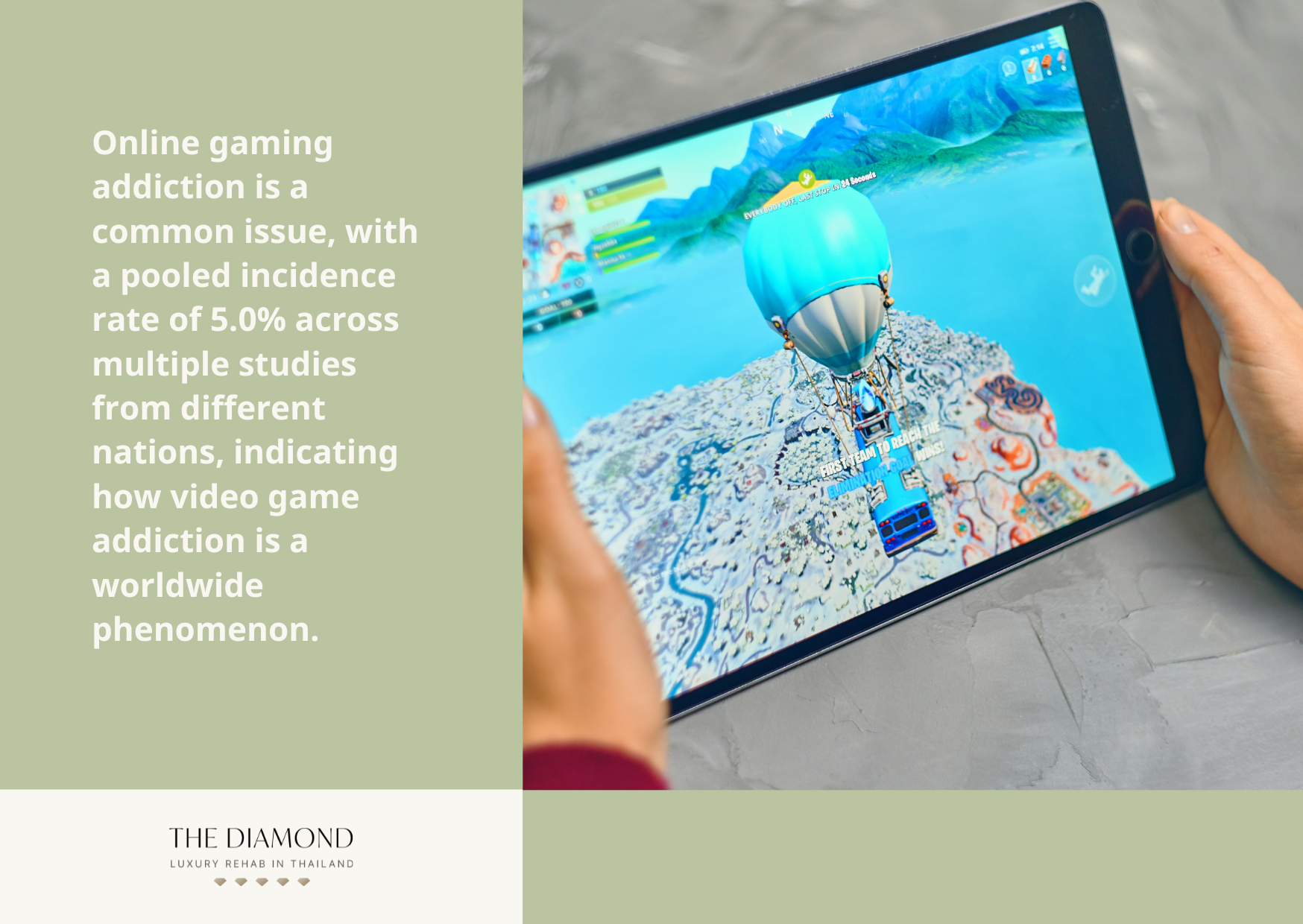
Online gaming addiction is a common issue, with a pooled incidence rate of 5.0% across multiple studies from different nations, indicating how video game addiction is a worldwide phenomenon, as confirmed by a 2023 paper by Limone et al., titled “The epidemiology and effects of video game addiction: A systematic review and meta-analysis.”
The study additionally pointed out how video game addiction is more prevalent among males and younger individuals. In the United States, 58% of gamers are under the age of 34, with the majority of gamers being minors, adolescents, and young adults.
The finding is consistent with the observation that gaming frequently commences in childhood, potentially resulting in addiction in young adulthood.
What are the other names for gaming (video game) addiction?
The other names for gaming (video game) addiction are gaming disorder, internet gaming disorder (IGD), and pathological video game use. Each term reflects different aspects of the issue, but all refer to the same underlying problem—an uncontrollable urge to engage in video game play despite harmful consequences.
Gaming disorder is the term recognized by the WHO, while IGD is listed as a condition for further study in the DSM-5-TR. In psychological research, pathological video game use is frequently employed to underscore the compulsive nature of the behavior and the condition’s negative effects on emotional, social, and mental well-being.
Why are video games addictive?
Video games are addictive since they activate the reward system in the brain, therefore producing regular dopamine release throughout play. Players are encouraged to keep engaging in the activity because the chemical reaction brings about sensations of pleasure and contentment.
According to a 2023 study by Mohammad et al., titled “Symptoms, Mechanisms, and Treatments of Video Game Addiction,” the prefrontal cortex (PFC) and ventral striatum (VS) are activated when individuals deliberately opt to engage in video gaming. Such regions are linked to decision-making and the expectation of rewards.
As gaming becomes habitual and compulsive, the dorsal striatum (DS) exhibits heightened activity, influenced by dopaminergic innervation. The shift signifies the change from voluntary to automatic behavior, a characteristic of addiction.
Repeated exposure to elevated dopamine levels over time reinforces specific gaming habits, making it more difficult to control or quit playing. Plenty of video games are made to keep players interested and help create obsessive behaviors by offering continual rewards, challenges, and achievements.
What are the symptoms of online gaming addiction?
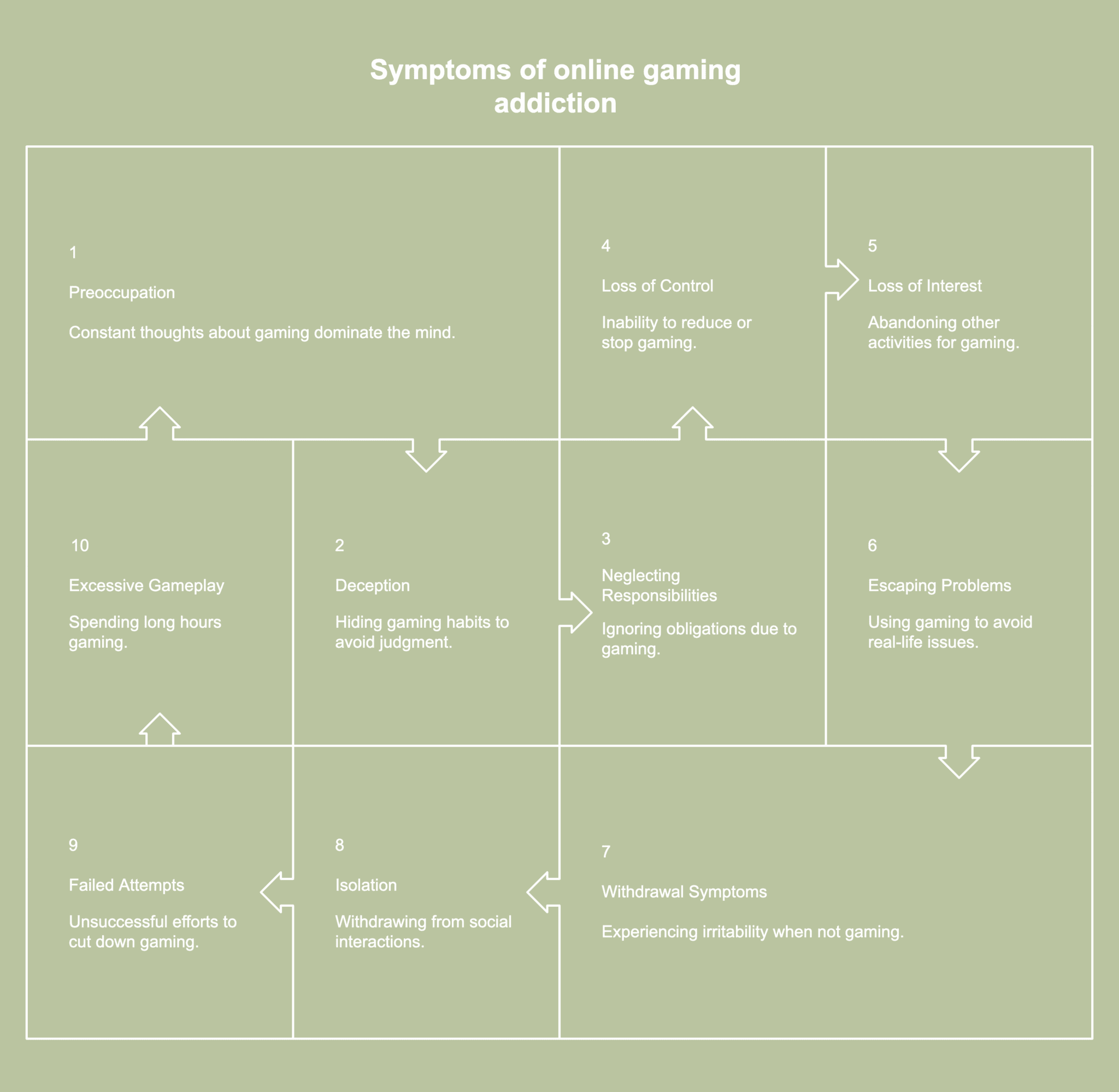
Symptoms of online gaming addiction describe the visible indicators and patterns of behavior pointing to a problematic relationship with video games played online. The symptoms of online gaming addiction are listed below.
- Preoccupation with video games: Constant thoughts about video games often dominate the person’s mind, even when not playing. Planning the next gaming session or reliving past gameplay becomes a frequent mental activity. Such a level of obsession quickly interferes with daily focus and concentration.
- Deception and secrecy: Affected individuals start hiding gaming habits from others to avoid judgment or conflict. Lying about time spent playing or pretending to do something else often becomes a pattern. Secrecy around gaming often leads to a breakdown in trust between family members or friends.
- Neglecting responsibilities: As gaming becomes a priority, basic obligations like schoolwork, chores, or job duties are frequently ignored. Missed deadlines, declining grades, or poor work performance signal the symptom. Neglect extends to personal hygiene, meals, or sleep schedules. The increasing disregard for essential tasks reveals the growing impact of addiction on everyday functioning.
- Loss of control: Attempts to reduce or stop gaming often fail, even when the individual recognizes the need for change. Repeated promises to cut back often remain unfulfilled. Time spent gaming gradually increases beyond intended limits. Loss of self-regulation reflects the compulsive nature of the behavior.
- Loss of interest in other activities: Hobbies, sports, and social gatherings once enjoyed often lose appeal as gaming takes over. Individuals withdraw from friends or decline invitations in favor of staying online. The narrowing of interests reduces overall life satisfaction. A 2023 study titled “Symptoms, Mechanisms, and Treatments of Video Game Addiction” by Mohammad et al., referenced a case of a teenager who gave up varsity baseball, a valued activity, after becoming captivated by Xbox Live, demonstrating how gaming displaces other interests and results in diminished academic achievement.
- Escaping problems: Video games often serve as a temporary escape from real-life stress, emotional pain, or personal struggles. Instead of addressing difficult situations, people turn to gameplay for relief. Avoiding problems through gaming often delays resolution and intensifies existing challenges. Over time, reliance on gaming as a coping mechanism deepens emotional dependence.
- Withdrawal symptoms: When unable to play, irritability, anxiety, restlessness, or sadness emerge. Emotional shifts mirror withdrawal effects seen in substance-related addictions. Physical discomfort or mood swings occur during forced breaks from gaming. Such symptoms indicate a strong psychological attachment to video game use.
- Isolation: Over time, heavy gamers begin withdrawing from family, friends, or social events. Personal connections often fade as gaming becomes the main source of interaction. Isolation increases feelings of loneliness and reduces support from others. Among the 200 students polled in a 2023 report by Xavier et al., titled “IMPACT OF ONLINE GAMING ADDICTION ON SOCIAL ISOLATION AMONG FIRST-YEAR SATHYABAMA UNDERGRADUATE STUDENTS: A STUDY,” 57.1% experienced social isolation while gaming, and 71.4% reported spending less time with family and friends, indicating a correlation between addiction and isolation.
- Failed attempts to cut down: Despite clear intentions, efforts to limit gaming time often prove unsuccessful. Frustration and guilt follow each failed attempt to regain control. Gaming addicts continue to promise change but quickly return to excessive habits. The ongoing struggle reflects how deeply rooted the addiction has become.
- Excessive hours of gameplay: Spending long, uninterrupted hours on video games becomes routine for many affected. Sleep schedules, meals, and personal care are often sacrificed to keep playing. What starts as casual gaming slowly evolves into marathon sessions. The behavior often signals a serious lack of balance in daily life.
What are the causes of online gaming addiction (internet gaming disorder)?
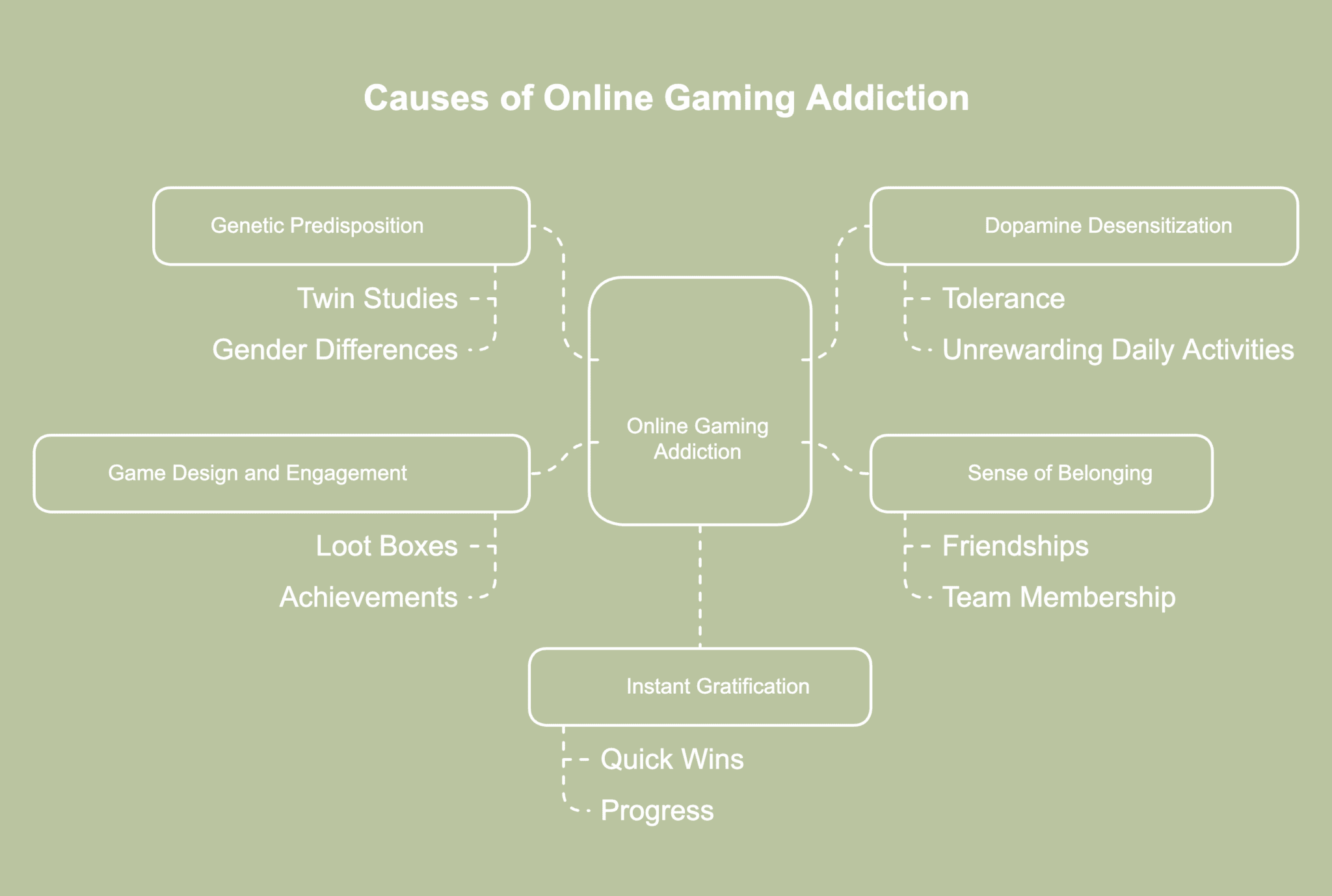
Causes of online gaming addiction (internet gaming disorder) refer to the underlying factors contributing to the development of excessive and compulsive video game use. The causes of online gaming addiction (internet gaming disorder) are listed below.
- Genetic predisposition: Certain individuals possess a biological vulnerability increasing the likelihood of developing addictive behaviors, including gaming addiction. As per a 2023 report by Nilsson et al., titled “The genetics of gaming: A longitudinal twin study,” higher genetic influence in males (31.3%–62.5%) compared to girls (19.6%–24.3%) points to genetic predispositions playing a more important part in male gaming behavior, possibly enhanced by environments encouraging gaming.
- Dopamine desensitization: Repeated exposure to the intense stimulation from gaming dulls the brain’s response to pleasure. Over time, players need longer or more frequent sessions to feel the same excitement. The growing tolerance reinforces excessive gaming habits. Normal daily activities start to feel uninteresting or unrewarding by comparison.
- Sense of belonging: Online games often foster tight-knit communities where players feel accepted and valued. For persons struggling socially in real life, gaming becomes a space to form friendships and feel connected. Being part of a team or guild strengthens emotional attachment to the gaming world. Social fulfillment encourages ongoing engagement, sometimes at the expense of real-world interactions.
- Game design and engagement: Various video games are built to be highly immersive and difficult to stop playing. Reward systems—loot boxes, achievements, and advancement mechanics—are used by game creators to maximize player retention, as noted in a 2023 study by Kiraly et al., titled “Gaming disorder: A summary of its characteristics and aetiology.” Vulnerable individuals often find such components highly satisfying and difficult to resist. Although not inherently addictive, design features like these increase gaming disorder (GD) risk in susceptible players.
- Instant gratification: Video games frequently reward players with quick wins, progress, or praise. Immediate rewards stimulate the brain’s pleasure centers, encouraging repeated play. Real-life accomplishments often take more time and effort, making games the more appealing choice. Such patterns gradually shift focus away from long-term goals.
What are the risk factors for online video game addiction?
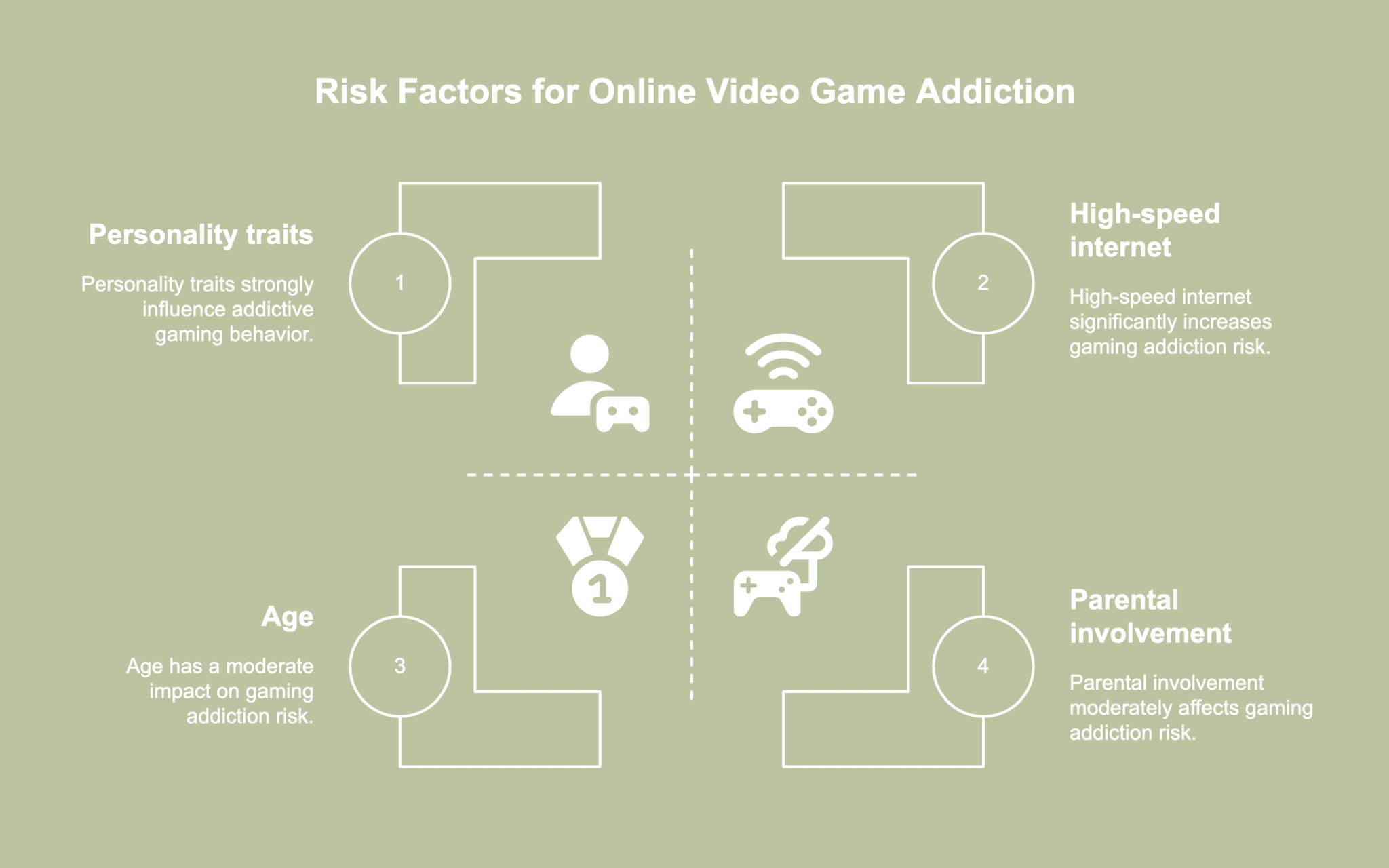
Risk factors for online video game addiction describe circumstances, characteristics, or influences raising the possibility of engaging in obsessive gaming. The risk factors for online video game addiction are listed below.
- Age: Younger individuals, particularly children and adolescents, face a higher risk of developing internet gaming addiction. The developing brain remains highly sensitive to reward-seeking behavior. Maturity needed to regulate screen time or recognize harmful patterns is often not yet present. Early exposure to gaming often sets the stage for long-term compulsive habits.
- High-speed internet: Fast and uninterrupted access to online games removes natural breaks that help limit usage. Continuous gameplay becomes easier when loading times or technical issues are minimal. The convenience of instant access often leads to longer gaming sessions. With fewer obstacles to entry, excessive play becomes more frequent.
- Personality traits: Certain personality types are more prone to addictive gaming behavior. According to a 2024 study by López-Fernández et al., titled “Big five personality traits, gaming motives, and regular and disordered gaming: A cross-national examination among college student gamers in seven countries,” low conscientiousness exhibited the highest link to disordered gaming among the five major personality traits—openness, extraversion, agreeableness, conscientiousness, emotional stability—indicating people with reduced self-discipline and organization are more likely to be afflicted.
- Lack of alternative activities: When options for social, recreational, or creative outlets are limited, video games often fill the void. Many turn to gaming due to boredom or the absence of other engaging experiences. Without variety in daily life, the appeal of digital entertainment grows stronger. Over-reliance on gaming emerges when meaningful alternatives are missing.
- Mental health issues: Depression, anxiety, and attention-related disorders often increase the risk of compulsive gaming. Video games provide temporary distraction or relief from psychological distress. Instead of addressing emotional pain, certain people rely on gaming to cope. Continued avoidance of mental health struggles reinforces addictive behavior.
- Social isolation: Limited real-world interaction often pushes individuals toward online games for connection and engagement. Loneliness makes virtual environments feel more comforting and welcoming. Players begin to replace in-person relationships with digital ones. Such a shift increases dependence on gaming for emotional support.
- Competitive environment: Online games often encourage constant comparison, rankings, and performance-based rewards. The drive to outperform others tends to quickly become consuming. According to a 2023 study titled “Gaming disorder: A summary of its characteristics and aetiology” by Kiraly et al., the relationship between GD and psychological problems (such as stress and depression) is stronger in societies with high levels of vertical individualism, placing emphasis on accomplishment and competition. The pattern becomes especially apparent in massively multiplayer online games (MMOs), where achieving success in the game serves as a coping mechanism for psychological distress.
- Peer pressure: Friends or classmates who regularly play games often influence others to join or keep up. Refusing invitations or missing out on group activities cause social discomfort. As a result, individuals feel compelled to match others’ gaming habits. Peer expectations turn occasional play into a daily routine.
- Escapism: Games offer an easy way to avoid real-life stress, failures, or responsibilities. Gaming addicts prefer virtual achievements over facing daily struggles. Escaping into a game world provides temporary relief from unpleasant emotions. Over time, the behavior replaces healthier coping methods.
- Accessibility: Video games are now available across smartphones, tablets, consoles, and PCs, making gameplay easier to engage in anytime. Constant availability increases the temptation to play frequently. With few restrictions, gaming often becomes a default activity during free time. Easy access significantly raises the risk of overuse.
- Rewards and progression systems: Numerous games feature structured systems offering players a sense of growth and accomplishment. Earning points, unlocking levels, or gaining virtual items reinforces repeated play. Such features aim to maintain user engagement. Progress becomes addictive when linked to personal worth or satisfaction.
- Parental involvement: Limited guidance or monitoring from parents often allows excessive gaming to go unchecked. Without rules or time limits, young players are more likely to form harmful habits. A lack of open conversations about balance and well-being worsens the situation. According to an April 2025 paper by Zaheed et al., titled “Parent Attachment and Video Gaming Addiction: The Serial Mediation Role of Social Support and Maladaptive Daydreaming,” teenagers with stable parental relationships tend to be more emotionally secure, reducing the urge to use gaming as an escape.
How is online video game addiction prevented?
Online video game addiction is prevented by setting clear limits on screen time, encouraging healthy routines, and promoting balance between digital and offline activities. Digital games must be played in moderation, with structured schedules leaving space for school, hobbies, and social interaction.
Engaging in outdoor activities or real-life social experiences reduces dependence on online games as a primary source of enjoyment or escape. Open communication, supervision of game use, and early emotional needs assessment are all important responsibilities of parents and caregivers.
Through combined efforts, the likelihood of online game addiction is reduced, and more positive gaming practices are promoted.
What are the effects of online gaming addiction (internet gaming disorder)?
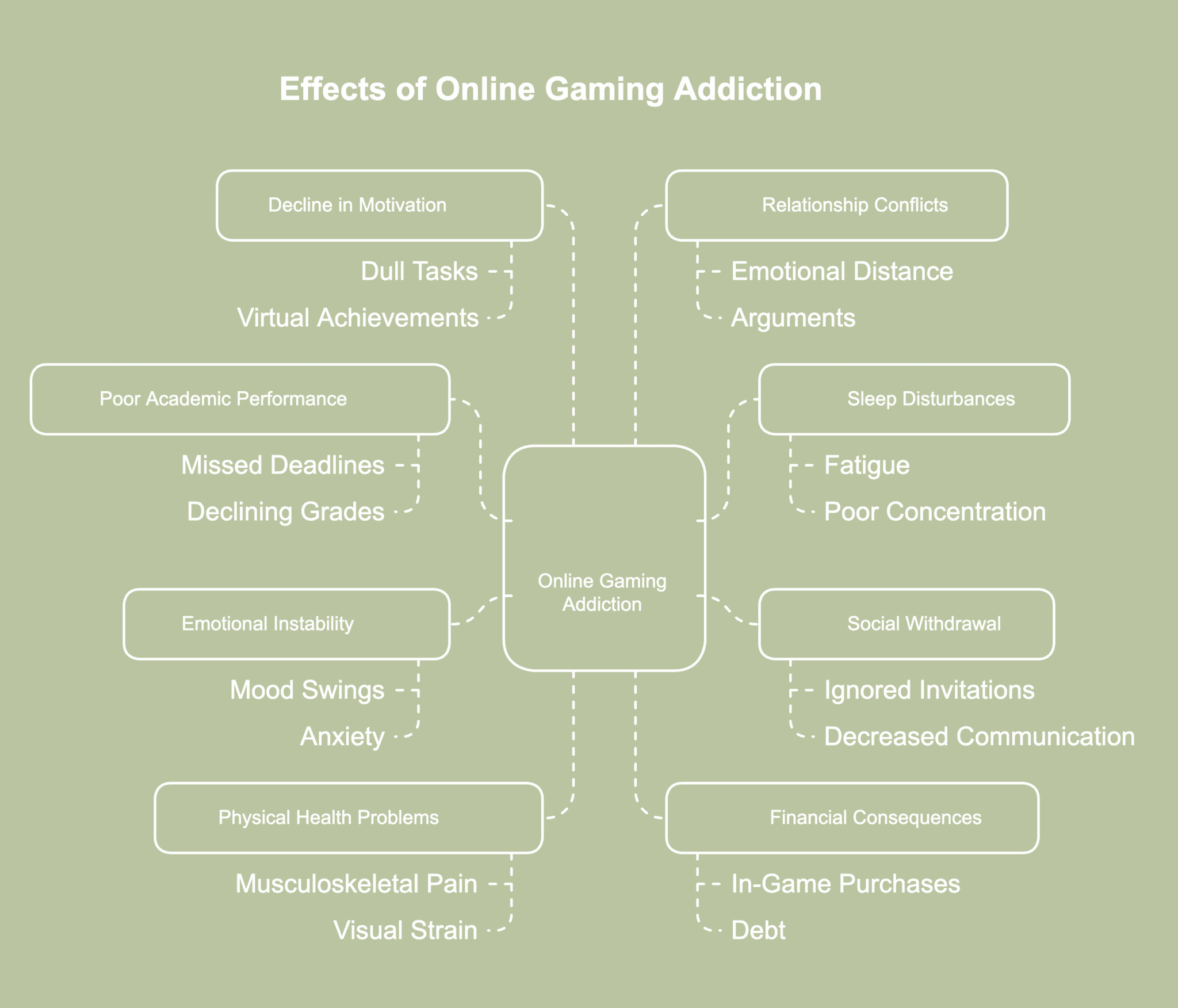
Effects of online gaming addiction (internet gaming disorder) refer to the negative consequences arising when online video game use becomes unhealthy and disruptive. The effects of online gaming addiction (internet gaming disorder) are listed below.
- Poor academic or work performance: Time spent gaming often cuts into hours meant for studying or completing tasks. Missed deadlines, incomplete assignments, and declining grades or productivity become more common. According to a 2023 study by Sun et al., titled “The effects of online game addiction on reduced academic achievement motivation among Chinese college students: the mediating role of learning engagement,” addiction to online games dramatically lowers learning engagement on all three levels, with behavioral engagement being most affected, followed by emotional and cognitive engagement. Due to time displacement or psychological obsession with gaming, addicted students often avoid participating actively in class, feel disconnected from the learning environment, and struggle to focus mentally on academic tasks.
- Sleep disturbances: Late-night gaming sessions interfere with regular sleep schedules. Individuals stay up for hours, sometimes into the early morning, to continue playing. The lack of rest results in fatigue, poor concentration, and irritability the next day. Over time, sleep deprivation impacts both physical and mental health.
- Social withdrawal: Frequent gaming often replaces time spent with friends or family. Invitations to social events are ignored or declined in favor of staying online. Communication outside of gaming environments gradually decreases. The pattern creates isolation and weakens important relationships.
- Emotional instability: Mood swings, frustration, and irritability often develop when gameplay is interrupted or restricted. Gaming becomes a main source of emotional regulation. Without access, people feel anxious, angry, or restless. Emotional reliance on games makes coping with everyday stress more difficult.
- Physical health problems: Extended hours of gameplay usually involve prolonged sitting, poor posture, and lack of exercise. The condition is associated with health hazards like musculoskeletal pain, visual strain (e.g., headaches, dry eye syndrome), neurological effects (e.g., seizures, hallucinations), and metabolic issues (e.g., weight gain, junk food intake), as noted in a 2023 publication, titled “Digital gaming, musculoskeletal, and related health hazards among adolescents and young adults” by Kumar et al.
- Financial consequences: Gaming addicts spend large sums of money on in-game purchases, upgrades, or subscriptions. Spending often becomes impulsive and difficult to control. Budgets are neglected in favor of digital rewards. Eventually, financial irresponsibility leads to financial strain or debt.
- Decline in motivation: The desire to achieve real-life goals weakens as online gaming becomes more rewarding and stimulating. Tasks once considered meaningful—whether academic, professional, or personal—begin to feel dull in comparison to the excitement of virtual achievements. Without strong motivation to pursue offline success, individuals risk falling behind in areas essential for long-term fulfillment.
- Relationship conflicts: Time spent immersed in online games often creates emotional distance between the gamer and people in their immediate environment. Loved ones often express frustration over being ignored, unheard, or deprioritized, especially when important conversations or quality moments are repeatedly interrupted by gameplay. Arguments arise more frequently as communication breaks down and trust starts to fade.
What are the treatment options for online gaming addiction?
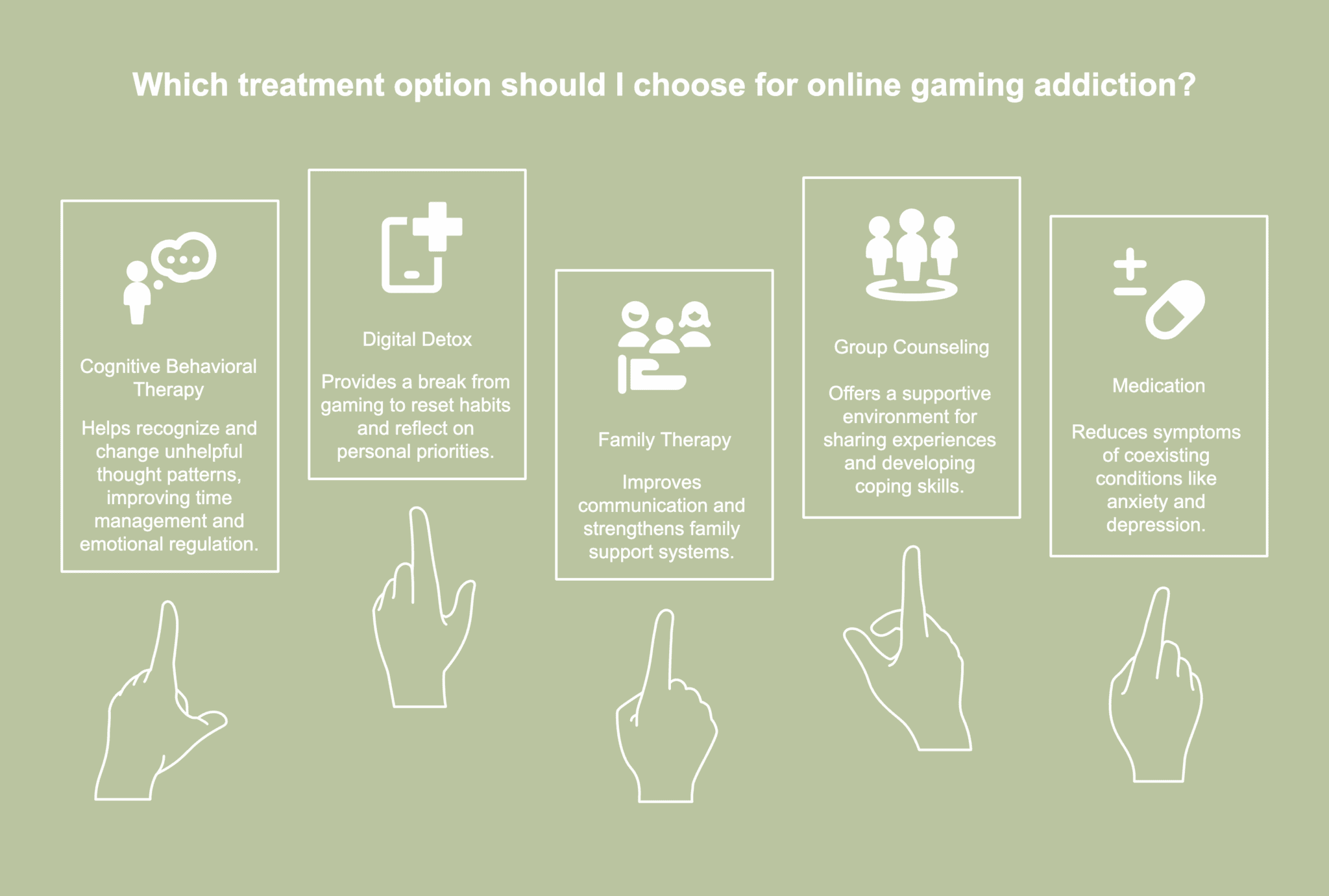
Treatment options for online gaming addiction denote various treatment methodologies and support mechanisms designed to assist individuals in regaining control over gaming habits. The treatment options for online gaming addiction are listed below.
- Cognitive behavioral therapy (CBT): Cognitive behavioral therapy helps individuals recognize unhelpful thought patterns influencing compulsive gaming. Addressing distorted beliefs and replacing those with healthier perspectives allows clients to respond to stress or triggers in more constructive ways. Therapists guide individuals through practical exercises aimed at developing time management, problem-solving, and emotional regulation.
- Digital detox: Digital detox involves taking a structured break from online games to reset habits and restore balance. During digital detox, individuals engage in offline activities that promote mindfulness, physical health, and real-world connection. The goal isn’t just abstinence but creating space to reflect on personal priorities and regain control over screen use. A temporary disconnect often reveals how gaming has disrupted other areas of life.
- Family therapy: Involving the family in treatment improves communication, strengthens support systems, and addresses conflicts rooted in or worsened by gaming addiction. Sessions often uncover patterns of misunderstanding or unmet emotional needs between the addicted individual and loved ones. Through guided dialogue, families work together to set clear boundaries, offer accountability, and rebuild trust.
- Group counseling: Group counseling provides a supportive environment where individuals explore shared struggles related to online gaming addiction. Participants engage in guided discussions, gain feedback, and develop coping skills through collective learning. Results of a 2023 report by Chen et al., titled “Effective interventions for gaming disorder: A systematic review of randomized control trials” found group counseling raised self-esteem and self-compassion while dramatically lowering GD intensity, anxiety, depression, maladaptive cognition, gaming hours, and shyness. Its interpersonal approach tackles escapism driven motivations.
- Medication: In certain cases, especially when gaming addiction coexists with anxiety, depression, or attention-deficit hyperactivity disorder (ADHD,) medication is considered. Preliminary evidence from a 2023 paper titled “A Systematic Review of Pharmacological Treatments for Internet Gaming Disorder” by Sá et al., indicated pharmacological treatments, specifically bupropion, methylphenidate, atomoxetine, and selective serotonin reuptake inhibitors (SSRIs), reduce symptoms of IGD by 15.4% to 51.4%. Bupropion showed the widest range of efficacy.
When should you seek treatment for online video game addiction?
You should seek treatment for online video game addiction when gaming behavior patterns begin to disrupt daily life, affect mental or physical health, or damage relationships. Video game addicts often ignore responsibilities, withdraw socially, or experience emotional distress when unable to play, signaling a need for professional support.
When attempts to reduce gametime fail or feelings of guilt, anxiety, or irritability increase, seeking help becomes essential. Early intervention allows individuals to regain balance, improve well-being, and develop healthier ways to manage stress or emotions.
How is online gaming addiction diagnosed?
Online gaming addiction is diagnosed through a comprehensive evaluation conducted by a mental health professional. Diagnosis typically involves assessing behavior patterns, emotional responses, and the impact of gaming on various aspects of life, such as school, work, health, and relationships.
Clinicians use criteria outlined in diagnostic tools like the DSM-5, which identifies internet gaming disorder based on proposed symptoms such as loss of control, continued use despite consequences, and withdrawal.
To diagnose gaming disorder, the behavioral pattern must be sufficiently severe to cause considerable impairment in an individual’s functioning across personal, familial, social, educational, occupational, or other critical domains, typically persisting for a minimum of 12 months, according to an article titled “Gaming disorder” from the World Health Organization.
How long does online gaming addiction recovery typically take?
The length of online gaming addiction recovery varies widely depending on the severity of the addiction, the individual’s motivation, the presence of underlying mental health issues, and the type of treatment used.
Certain individuals notice improvements within a few months, while others require a year or more to fully regain balance and control. Recovery is not always linear—progress includes setbacks and periods of adjustment as healthier habits are formed.
Consistent support, structured routines, and professional guidance often play a key role in long-term success.
How can parents effectively manage online gaming addiction in their children?
Parents can effectively manage online gaming addiction in their children by establishing clear limits for screen time, promoting substitute pastimes, and keeping lines of communication open. Addressing child gaming addiction involves more than just limiting device use—the process requires understanding the emotional or social needs behind the behavior.
Creating a balanced daily routine helps reduce the appeal of excessive gaming in children, especially when paired with consistent consequences and positive reinforcement. Through staying involved, monitoring game content, and modeling healthy digital habits, parents can guide children toward more mindful and controlled gameplay.
How does online gaming addiction relate to internet addiction?
Online gaming addiction is often viewed as a subtype of addiction to the internet, as both involve excessive use of digital platforms interfering with daily functioning. While internet addiction includes activities like social media, browsing, or streaming, online gaming addiction specifically centers on compulsive engagement with digital games.
Loss of control, withdrawal symptoms, and neglect of responsibilities are among the overlapping characteristics of the two conditions. Often, people dealing with online gaming addiction show similar behavioral patterns and consequences as individuals experiencing broader internet addiction.
How does online gaming addiction relate to online gambling addiction?
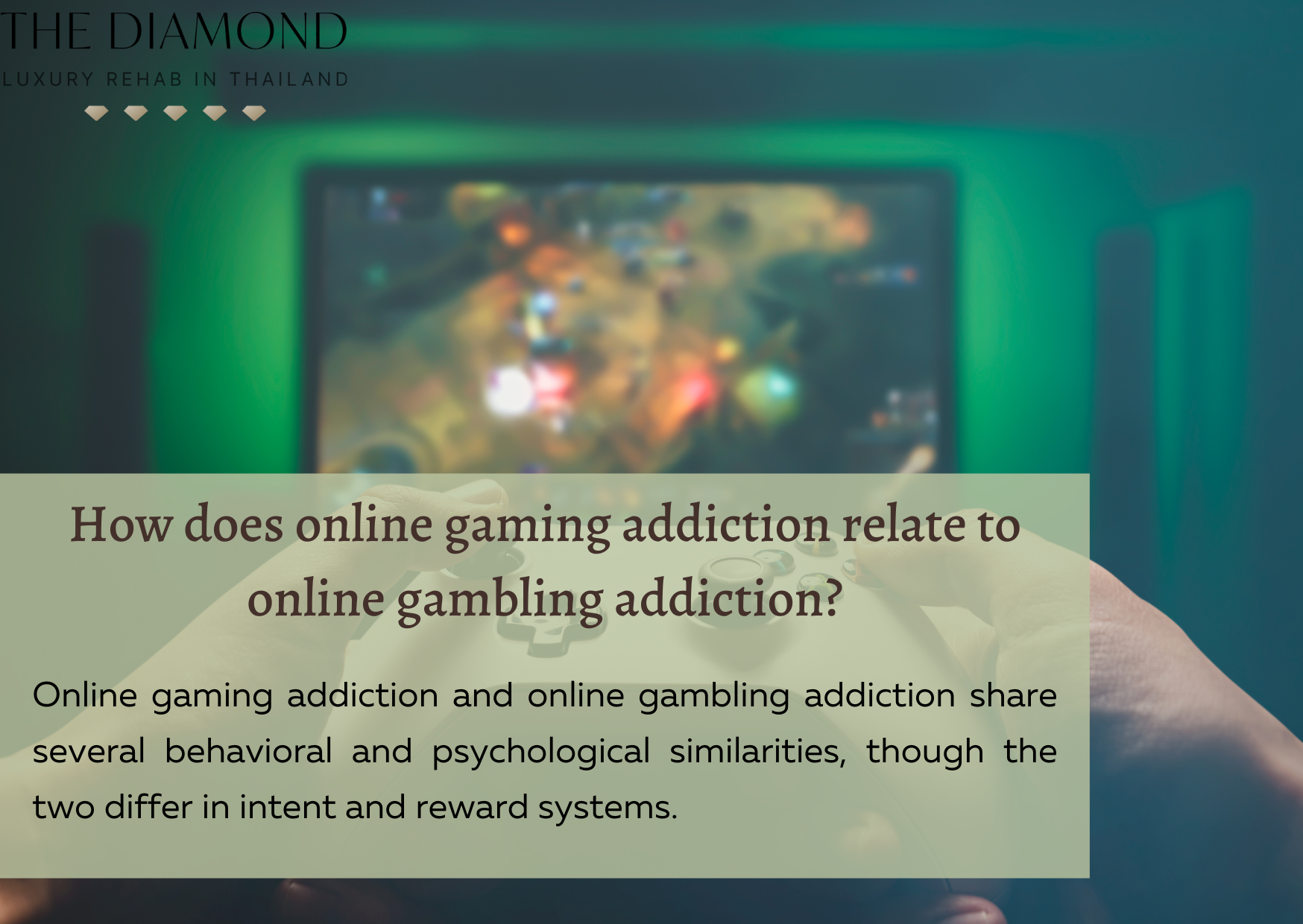
Online gaming addiction and online gambling addiction share several behavioral and psychological similarities, though the two differ in intent and reward systems. Both entail compulsive involvement, interrupted habits, and challenges in regulating impulses despite adverse outcomes.
The immersive nature of online platforms, the use of reward mechanisms like points or virtual prizes, and the emotional highs and lows tied to success or failure contribute to both conditions. Although problem gaming usually stresses ability and entertainment and online gambling addiction is about financial gain and chance, the underlying patterns—chasing rewards, emotional dependence, and time displacement—create a strong link between the two in terms of impact on mental health and daily functioning.
According to the findings of a 2018 study by James Sanders and Robert Williams, titled “The Relationship Between Video Gaming, Gambling, and Problematic Levels of Video Gaming and Gambling,” among video gamers from the past year, 78.5% engaged in gambling, while 70.7% of past-year gamblers participated in video gaming. The numbers suggest overlapping participation is common among individuals involved in either activity.

